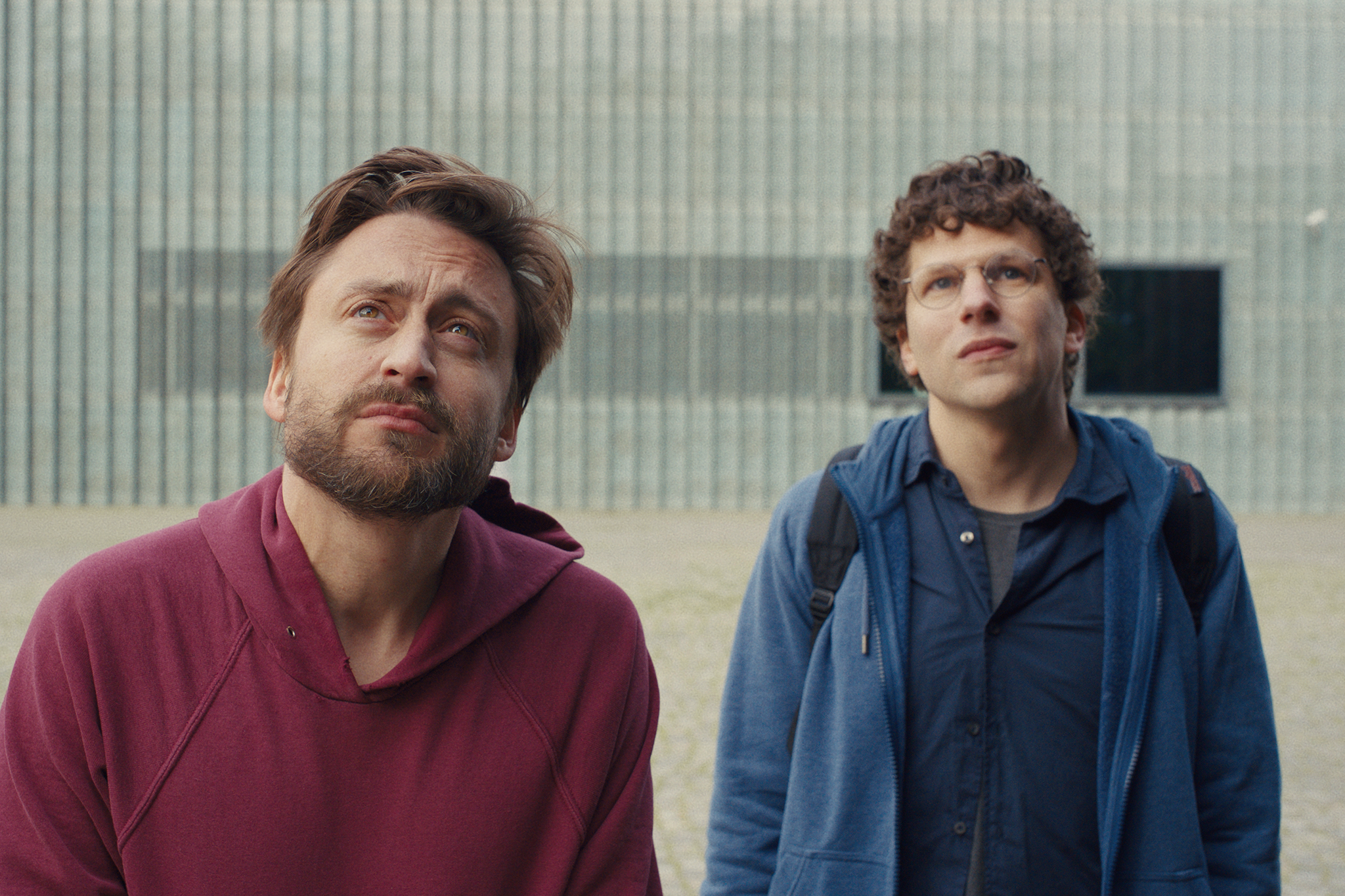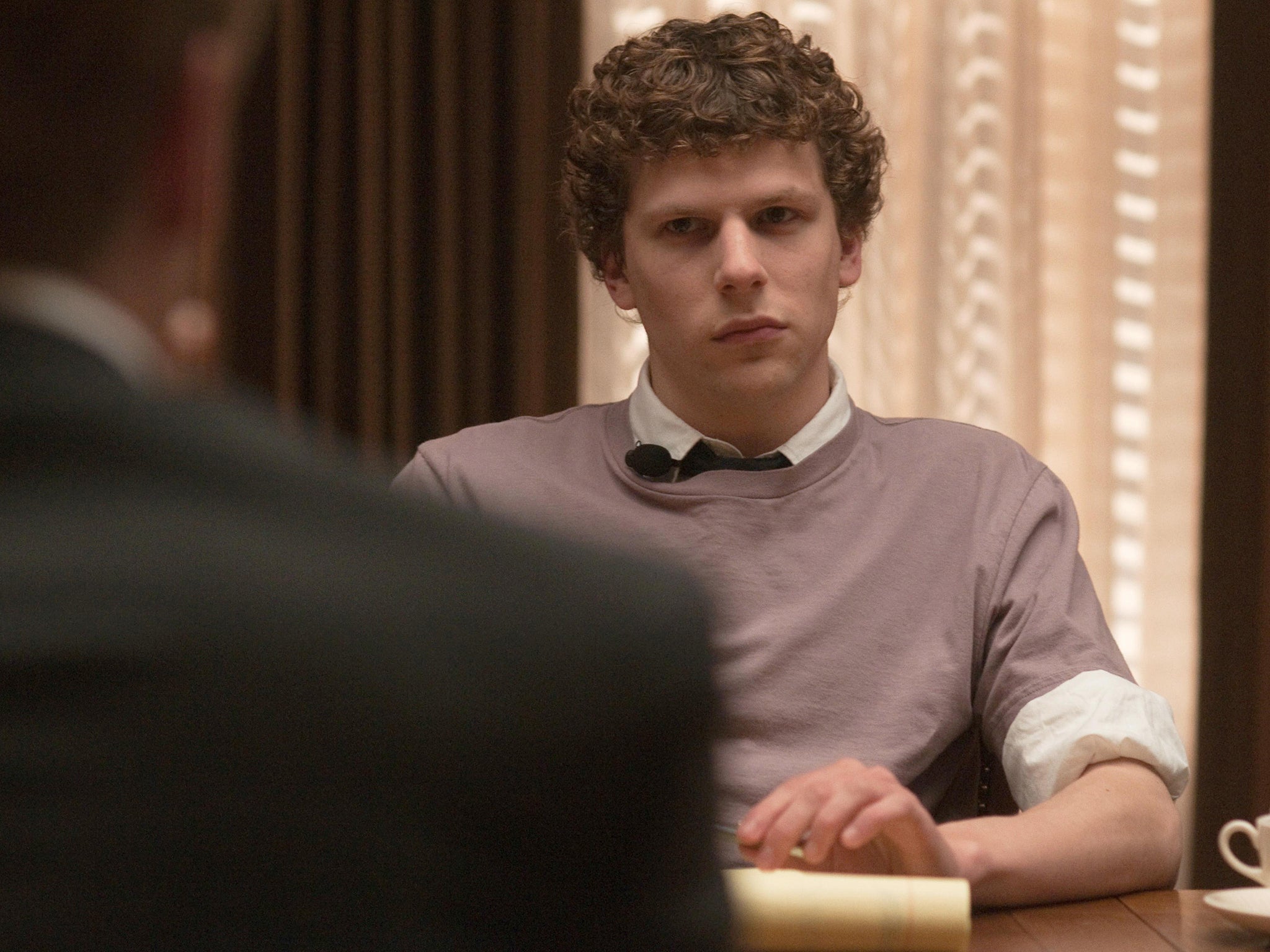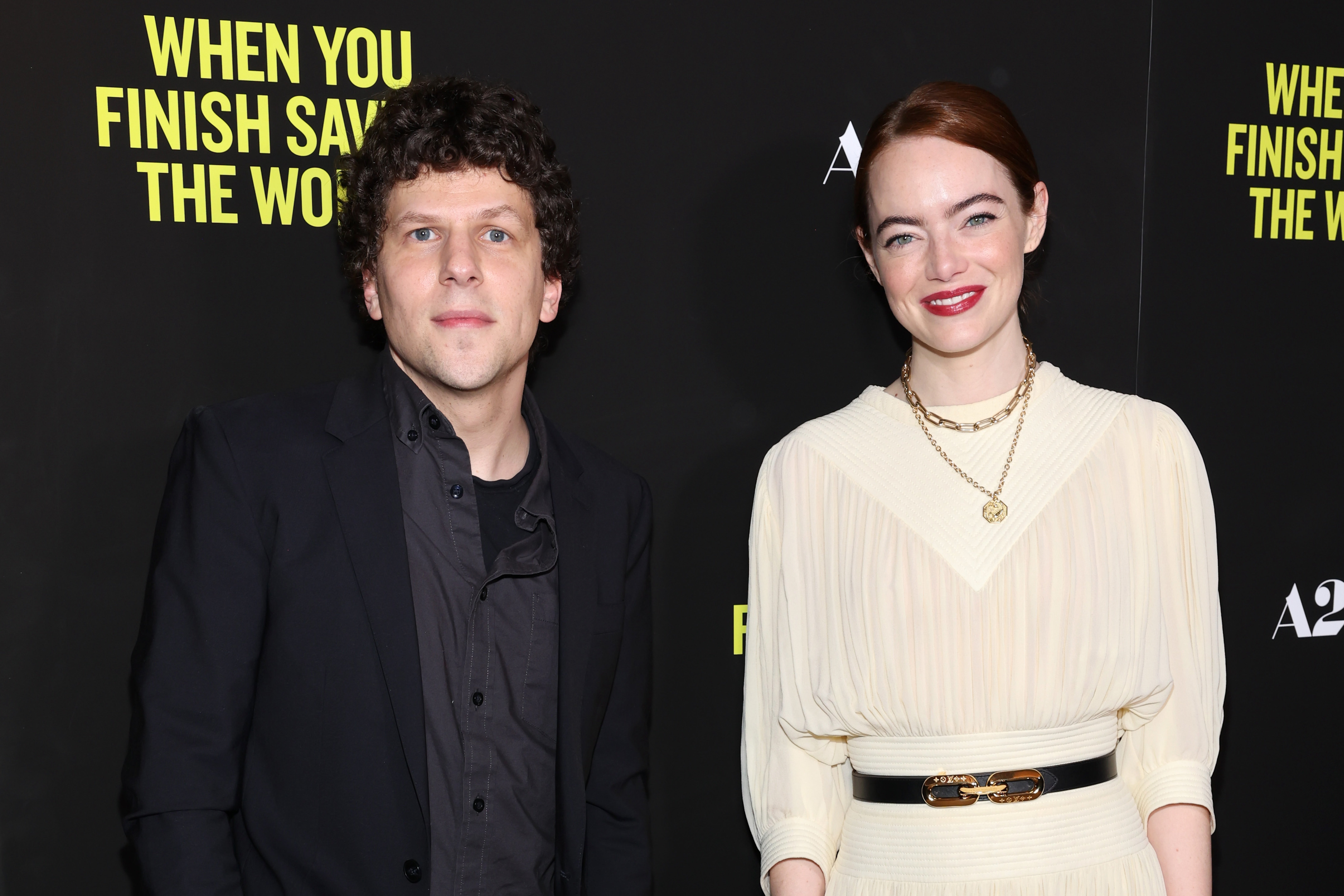Jesse Eisenberg: ‘My wife has shaped every thought I’ve ever had as an adult’
The sardonic, straight-faced star of ‘The Social Network’ sits down with Patrick Smith to discuss his new film ‘A Real Pain’, his friendship with ‘fairy godmother’ Emma Stone, and the ‘transient’ effects of his early fame – with a special appearance from his seven-year-old son


Your support helps us to tell the story
From reproductive rights to climate change to Big Tech, The Independent is on the ground when the story is developing. Whether it's investigating the financials of Elon Musk's pro-Trump PAC or producing our latest documentary, 'The A Word', which shines a light on the American women fighting for reproductive rights, we know how important it is to parse out the facts from the messaging.
At such a critical moment in US history, we need reporters on the ground. Your donation allows us to keep sending journalists to speak to both sides of the story.
The Independent is trusted by Americans across the entire political spectrum. And unlike many other quality news outlets, we choose not to lock Americans out of our reporting and analysis with paywalls. We believe quality journalism should be available to everyone, paid for by those who can afford it.
Your support makes all the difference.Jesse Eisenberg is hunched forward in his seat in a Soho hotel room, speaking rapidly, digressively, about the film he has just written and directed. In A Real Pain, the star of The Social Network plays what can only be described as an Eisenbergian character – clever, introverted, socially awkward – on a pilgrimage to Poland with his cousin (Kieran Culkin) to revisit a painful part of his family history. Eisenberg made that same trip in real life. In the film, he repeatedly watches videos of his son being cute, marvelling at his curiosity. Here and now, Eisenberg pauses our interview to take a video call in the hotel room. It’s his seven-year-old son, Banner, who wants to show him how he pronounces his Rs. Eisenberg marvels. “Oh honey, you’re such a good student,” he tells him. “You sound perfect.” Father and son in both scenarios, it turns out, are the same people. “Were you starstruck?” Eisenberg asks me of his boy’s budding celebrity.
There was a time when Eisenberg was known for being a tricky interviewee – not in the expect-a-call-from-his-publicist-later kind of way, but rather in the sense that he might destroy you with a withering putdown should you fail to measure up intellectually. Today, the 41-year-old is a tough interview for altogether different reasons. He is genial and unfailingly polite, but – amid the fusillades of observation, introspection and droll self-doubt – he lives up to his reputation of asking questions as much as answering them (which may be why I find myself off on a tangent explaining that the London borough of Walthamstow is associated with the boyband East 17).
In the flesh, he has the air less of a leading man than of a former child prodigy turned writer. He has a slight build and is dressed in a navy polo jumper, straight-leg jeans and New Balance trainers. His eyes dart like minnows beneath a fringe; between his fingers is a teaspoon that he plays with skittishly. “I’m in a constant state of nervousness,” he notes, dryly.
That tracks, of course. Eisenberg has talked about the obsessive-compulsive disorder, social anxiety and depression he’s had since he was a child; in 2017, he recorded a video in which he offered advice to his younger self on overcoming these inner struggles. More recently, in a story he wrote for The New Yorker titled “A GPS Route for My Anxiety”, Eisenberg described its narrator as staring at a sunset and wondering why “something so viscerally, timelessly beautiful” leaves him “completely cold. How is it possible,” he continued, “that your antidepressant is keeping you functional but also stifling any semblance of spiritual epiphany?” I wonder if Eisenberg thinks that medication prevents you from being able to feel things.
“Oh yes,” he says. “I mean, I have no opinions for other people, but for myself, I’m just constantly asking my therapist, ‘Is this going to make me less creative?’ And he tells me all the time, ‘You asked me this last week, and every other patient I see asks me this as well, and I say, I don’t think so.’ Every artist is paranoid about the same thing, which is ‘I want to be happy, but I don’t want to lose the thing that allowed me to write the poem.’”
What also seems to rescue Eisenberg from spiralling inexorably – besides medication and a weekly trip to see his therapist – is having a close-knit family. Even when I ask how he feels about cancel culture – he’s worked more than once with Woody Allen – he widens the focus to how his feelings about social justice in general have been influenced by those closest to him. “My wife comes from a family of activists,” says Eisenberg. (He’s married to the charity worker Anna Strout, whose mother, Toby Strout, ran a domestic violence shelter, and whose brother, Anthony Arnove, co-founded a non-profit arts organisation.) “I married into a brilliant left-wing family, and my wife has shaped every thought I’ve ever had as an adult,” he continues. “So I’m a supporter of all social movements that lift up those who need a lift.”
Given his father’s a sociology professor, it’s likely that Eisenberg – who grew up in Queens, New York and New Jersey – already had a grasp of social currents when he met Strout aged 18. By then, he’d also begun to develop an ear for dialogue, having become obsessed early on with Borscht belt humour, a brisk, hyper-self-critical brand of comedy that thrived at the Jewish holiday resorts in upstate New York in the middle of the 20th century. His mother, a professional clown who worked at children’s parties, would distil elements of it into her act. “She taught me the dedication needed to do something creative,” Eisenberg once said.

His own family history is key to A Real Pain. Deftly finding a balance between big laughs and pathos, the film is as perceptive and melancholic as it is funny, a finely modulated study of historical trauma. It’s also partly autobiographical, as Eisenberg’s David and Culkin’s Benji, looking to honour the final wishes of their beloved grandmother Dory, a Holocaust survivor, visit the place where she used to live, near the concentration camps in Poland.
The house they make their way to once belonged to Eisenberg’s ancestors. Although his grandfather’s family, including his great aunt, moved from there to New York in 1918, 21 years before the invasion of Poland triggered the Second World War, his other relatives stayed put and were murdered, explains Eisenberg. “They were taken to the cemetery and shot, which was doubly strange, because our trailers were parked across the street from the cemetery. This was the history of Jews in this town.”

Watch Apple TV+ free for 7 days
New subscribers only. £8.99/mo. after free trial. Plan auto-renews until cancelled

Watch Apple TV+ free for 7 days
New subscribers only. £8.99/mo. after free trial. Plan auto-renews until cancelled
One of Eisenberg’s Polish cousins survived the Holocaust. She lived in Izbica, south of Lublin, close to the border with the part of Soviet Russia that is now Ukraine. The town became a transfer point for Jews being taken to the death camps in Belzec and Sobibor. “My cousin Maria survived through, as we say in the movie, ‘a thousand miracles’, he explains. “She stayed in Poland [after the war] and moved to Szczecin, which is in the north, and my first play [The Revisionist] was about her. Vanessa Redgrave played Maria in it. She was kind of the lone survivor of the family, and her story is just one kind of horror story after another, even post-war. So this character of Dory in A Real Pain was a combination of my cousin Maria, who survived, and my great-aunt Doris, who kind of shaped my life.”
This traumatic family history was, for a time, not spoken of. “What’s weird is my parents were never told about what happened to their families, to their aunts and uncles and cousins, because I think there was a feeling from their parents, my grandparents, that we didn’t do anything,” says Eisenberg. “There’s just a great feeling of survivor’s guilt – that my grandparents survived when all their contemporaries died. So they never talked about it with my parents.
“I’m the third generation American, and for me, I had enough distance to become really interested in it. My curiosity was not fraught with a sense of guilt or denialism.” At the beginning, Eisenberg says, it was “almost academic, like, ‘Oh, what happened to us? I’m so curious, what happened to our family?’” That distance from the complex emotional spectrum his parents experienced, he believes, allowed him to research their history in a different way.

This interlocking of Jewish history with American identity, each reflecting the other, is what Eisenberg turns to when I ask him how A Real Pain’s depiction of the Jewish experience in Europe speaks to the current global situation. Like the film’s central characters, he says, “I feel very American. I feel like I’ve been in New York for ten million years. I feel like my family has been eating at the New York delis for ten thousand years. [But] when I was learning about my family’s history, it seemed that we spent more time in Poland than America. I was struck by the idea that we, as a culture, can assimilate – we have a history of assimilating after being kicked out of countries, and that by the third generation, there’s no kind of visceral memory or connection to where we came from.”
In the film, he says, Culkin refers to how that creation of American identity is forged from other cultures. “Then later, when we’re talking to these Polish guys, I say I’m American and then immediately feel guilty that I’m saying I’m American, like I’m some kind of colonial power to these guys.”
Emma Stone persuaded me not to play an unhinged character while trying to direct a movie
Culkin’s Golden Globe-winning turn as the troubled manchild Benji is at the heart of A Real Pain. He plays him as a motor-mouthed mass of juxtapositions: hot-blooded yet sensitive, selfish yet kind, depressed yet ebullient. Eisenberg is the perfect foil for him, his David a neurotic New Yorker who sells digital ads for a living and finds his cousin enviably charming but infuriating. Eisenberg wrote the character of Benji, a composite of people he knew growing up, with himself in mind. “I was going to play him,” he says, “but I was persuaded not to play him by our producer, who’s Emma Stone. She was just saying not to play an unhinged character while trying to direct a movie, because she had done Poor Things and though she was not the director, she was managing stuff as a producer would while also playing this incredibly otherworldly character. So she just said, ‘From my experience, I don’t think you’re going to be comfortable playing this kind of role while trying to manage a set.’ And she was right, as she often is.”
It was also Stone who persuaded Culkin, her onetime boyfriend, not to drop out a few weeks before filming, after he panicked about being away from his children for too long. “She’s the greatest,” says Eisenberg. The pair met on the set of the 2009 film Zombieland, when he was 25 and she was 20. “I think of her as a friend, sure, but I really just think of her as like a fairy godmother. She’s read everything I’ve written, and seen my plays, and she’s just very supportive of me, and she’s so much more successful than me. I feel like she’s kind of letting me have some of her fairy dust that the world has been sprinkling on her for so many years, and I feel really indebted to her.”

Every time he tries to tell her that, though, he adds, “she tells me to shut up”. He describes her as “almost pathologically nice and engaged”. Stone produced Eisenberg’s directorial debut, When You Finish Saving the World (2022), a sardonic portrayal of a tricky mother-son dynamic starring Julianne Moore and Stranger Things’ Finn Wolfhard. She’s also signed up to produce Eisenberg’s next film, still untitled, with Paul Giamatti in the lead. “I feel like she’s given me a second shot at life, I really do,” he says.
By the time they first crossed paths, Eisenberg had already established himself as a distinctive voice in Hollywood, a player of garrulous, precocious types vibrating with discomfort, in films such as Roger Dodger (2002), The Squid and the Whale (2005) and Adventureland (2009). Then came David Fincher’s The Social Network (2010), for which Eisenberg received an Oscar nomination as Facebook inventor Mark Zuckerberg, and the world realised he could also do smug egotists with a knack for brutal deadpan (see also the magician film franchise Now You See Me and 2016’s Batman v Superman).
‘Richard Ayoade isn’t a natural leader – but he’s my favourite director that I’ve worked with’
Yet his favourite acting experience, he insists, was on the 2013 Dostoevsky adaptation The Double, written and directed by British comic actor Richard Ayoade. “He’s my favourite director,” says Eisenberg – not least, one suspects, because Ayoade, like Eisenberg, achieves his aims without being a dominant dictator. “He’s not a natural boss or leader,” Eisenberg notes, “[but] the set was run really well. He’s so creative and inspiring.”
Eisenberg is well aware that making admired films does not guarantee future success. He watched his popularity soar after The Social Network, but describes the effect as “transient”. “I’d been in some popular movies before – not as popular – and I’d seen kind of what happens: you’re celebrated for a brief period of time, and you’re on top of some vague lists and agencies for a few months, and then you go back to whatever your status is in the movie industry.

“I’m having that experience right now,” he says. “I made a movie that’s relatively popular, at least critically popular, so I’m getting a lot of calls and notes from people I haven’t spoken to in a long time, and that will go away in a few weeks, and then I’ll be back to feeling like, you know, a freelance artist eager to find my next job.”
It’s been the same since he was a 16-year-old on the US teen drama Get Real with a young Anne Hathaway. When that show got cancelled, he went back to chasing work wherever he could find it, which is why British viewers first got to see him in a Dr Pepper advert that still raises a chuckle. He was the kid asking “What’s the worst that could happen?” before taking the drink from a supermarket fridge – a sequence that ends with him trapped beneath a pile of food boxes, having his pants cut off, and being carried out by a fire crew shouting “Step aside! Butt naked kid coming through!”.
“I just remember that so well,” he says. “That commercial in some ways represented for me exactly what my life would be like – like I’m going to just be auditioning for anything, after being the lead on a show. That was a life lesson.”
‘A Real Pain’ is in cinemas
Join our commenting forum
Join thought-provoking conversations, follow other Independent readers and see their replies
Comments